Michigan helped make Donald Trump president. Is it ready to elect the nation’s first Muslim governor?
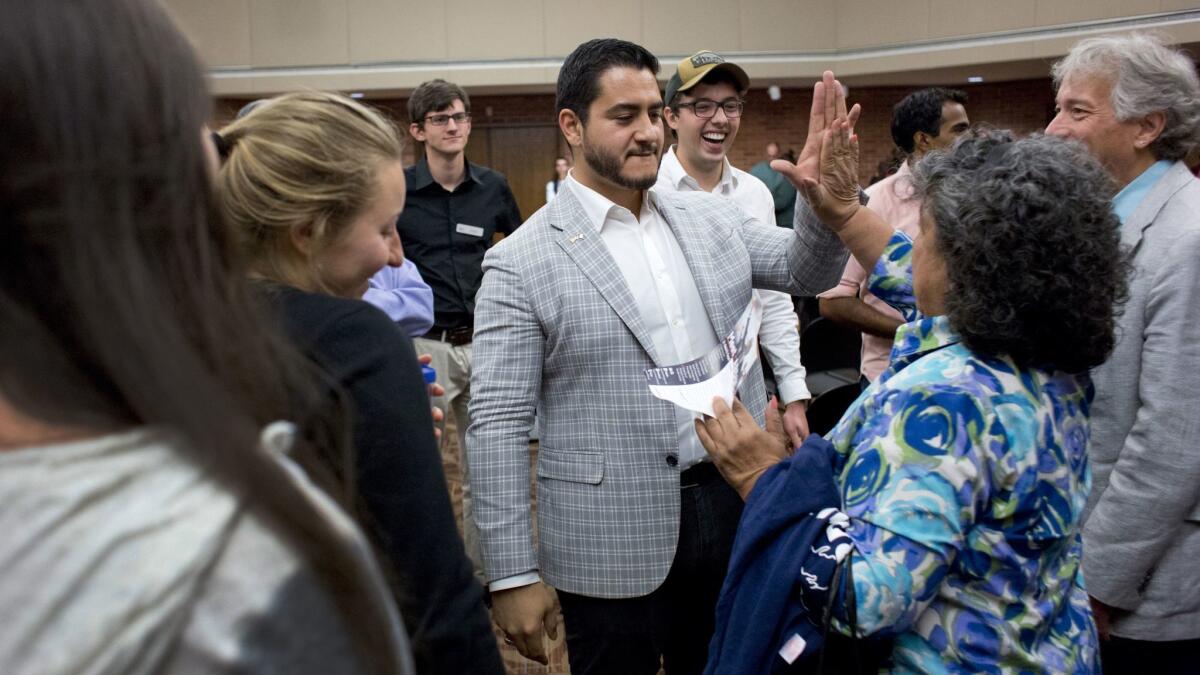
- Share via
Reporting from Kalamazoo, Mich. — The Democratic candidate for governor is about as Michigan — and all-American — as they come. He was born here, summered at Crystal Lake, spoke for his graduating class at the University of Michigan.
He helped rebuild Detroit’s ravaged healthcare system and is prepared now, he said, to tackle the rest of the state’s problems though he allowed as how, at a mere age 32, he may seem an unlikely savior.
“A lot of my friends tell me ... you’re relatively young,” he told the 50 or so liberal activists filling the pews at a church in downtown Kalamazoo. “What they sometimes don’t say is you’re also relatively brown and relatively Muslim.”
Abdulrahman El-Sayed — plain old Abdul in campaign literature — is running to become the first Muslim governor in the nation’s history, in a state vital to President Trump’s election last November.
The sentiment that fueled Trump’s narrow victory, a combustible mix of economic anxiety and political grievance that brewed for decades, hasn’t gone away in just a few months; now El-Sayed is the one channeling that discontent. “Our state is literally crumbling beneath us,” he says of its decayed infrastructure. “People have been locked out of our economy.”
But instead of fanning resentment, or egging audiences to lash out, El-Sayed seeks to uplift, suggesting his only-in-America story — a tale of immigrant parents and striving and overcoming ethnic and cultural differences, even within his own family — shows Michigan a way forward, if people look past things like skin color and religion.
From inner-city Detroit to the farthest rural reaches of the state, he tells audiences, there is a hunger for opportunity and safety and economic security. “In polarized times,” he says, “the single most empathetic thing we can do is reach out.”
It is a highly idealistic and aspirational notion, in an era when the country’s politics have rarely seemed so mean or low.
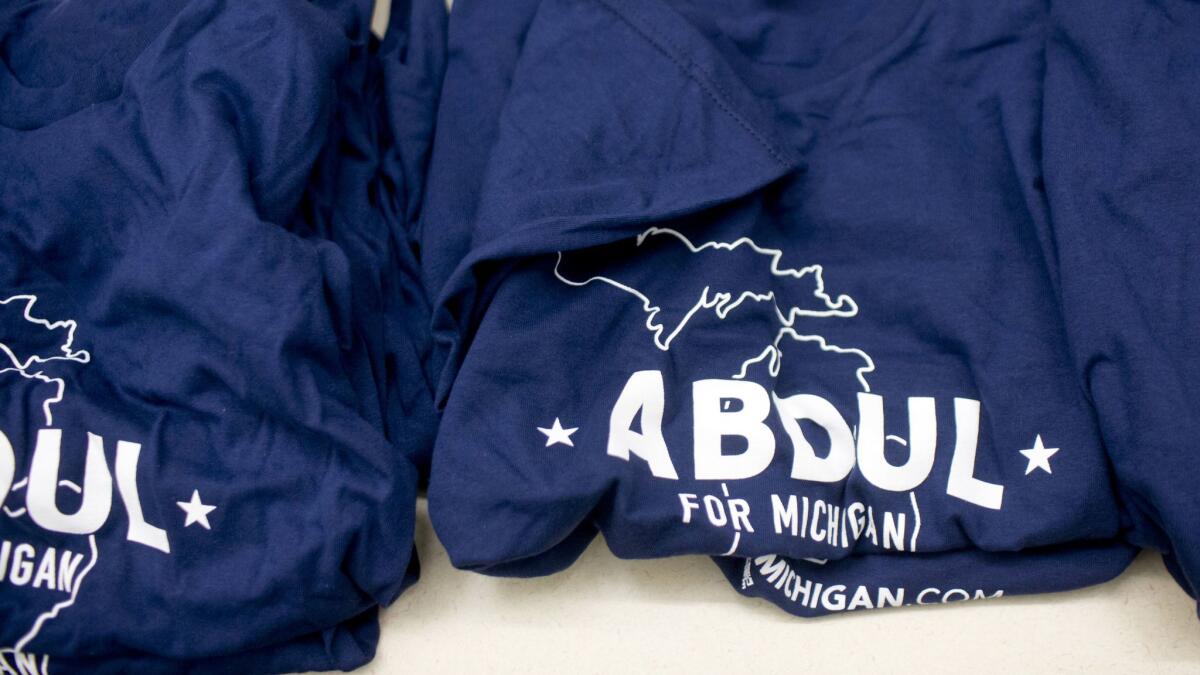
But El-Sayed has already raised more than $1 million, an impressive sum for a political newcomer, and established himself as a serious — if underdog — contender in the crowded gubernatorial field. The incumbent, Republican Rick Snyder, is termed out after 2018.
Since announcing his candidacy on a blustery February day, El-Sayed has visited 87 cities and more than half of Michigan’s 83 counties, traveling in pursuit of a belief that to know him is not necessarily to love him but, at least, to set aside judgment and hear what he has to say.
Then, perhaps, vote for him.
“There is going to be a little of, we’ll just say, consternation,” he acknowledged, as nightfall sifted through stained glass at the First Congregational Church. “But I also know that most of the time people recognize that if you care about their issues, once they’ve seen you, that abstract notion of your faith goes away.”
El-Sayed’s politics are unabashedly liberal, taking after Bernie Sanders’ anti-corporate, shake-his-fist-at-the-establishment approach. He supports government-run universal healthcare, legalized marijuana, a $15 minimum wage and a “sanctuary state” designation to aid undocumented immigrants.
Those positions could prove problematic in November 2018 in a state where Republicans have won five of the last seven gubernatorial contests and run both houses of the Legislature. “We’re not a liberal state,” said Ed Sarpolus, a veteran Michigan pollster, noting even many Democrats are conservative when it comes to cultural issues such as guns and abortion.
But before he even looks to the general election, El-Sayed must win the August primary, where the front-runner is former Democratic Senate leader Gretchen Whitmer.
“He’s got an uphill battle,” said Joe DiSano, a party strategist who is neutral in the contest. “If he goes up to places like Ishpeming and Caledonia” — to cite two small rural communities — “many of those folks have never met a Muslim. That’s a big problem.”
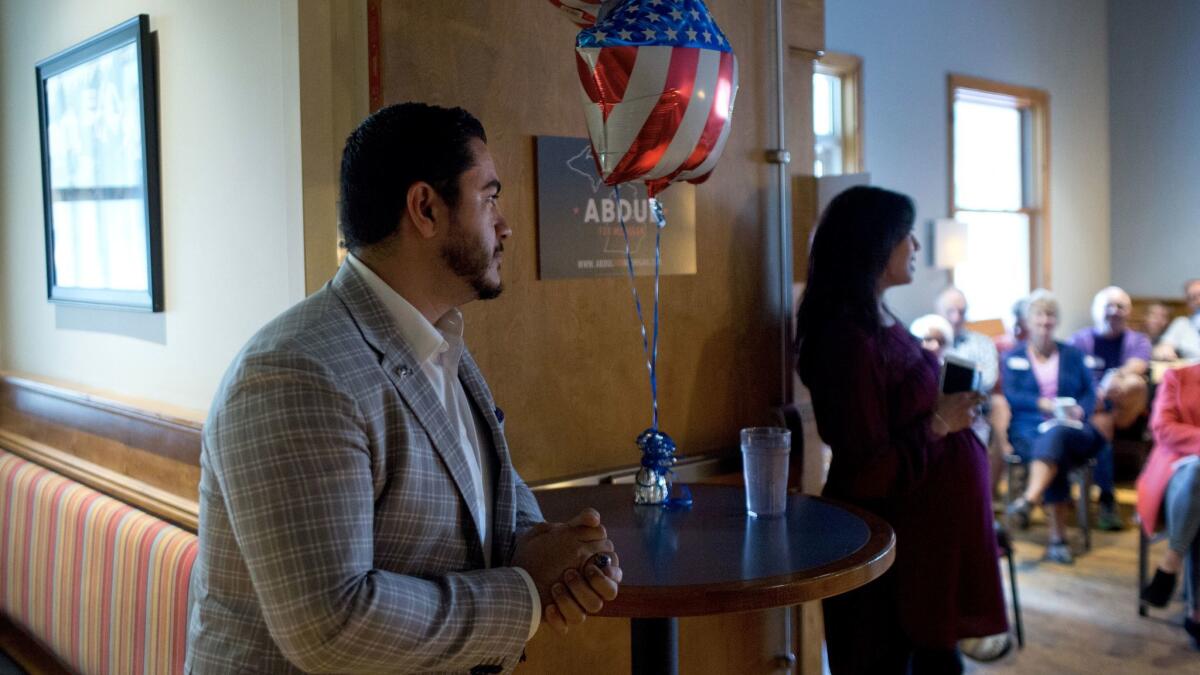
Undeterred, El-Sayed has a strategy that rests on a healthy dose of charisma, his identity as a physician just entering politics and a resume that fairly leaps off the page.
The son of Egyptian immigrants who settled in the large Arab-American community outside Detroit, El-Sayed captained his high school football, wrestling and lacrosse teams. Graduating from the University of Michigan he wowed the commencement speaker, President Clinton, with his eloquent introductory remarks (though El-Sayed ignored his advice to skip medicine and pursue a political career).
He became a Rhodes scholar, earned a doctorate in public health at Oxford, co-wrote the textbook he used to teach epidemiology at Columbia University, then in 2015, at age 30, gave up a tenure-track professorship to become Detroit’s director of public health. As he campaigns, he touts his work there providing free eyeglasses to poor kids, expanding testing for lead exposure and forcing an oil refiner to slash emissions in one of Detroit’s most polluted neighborhoods.
The impetus to quit and run for governor, he said, was the debacle in Flint, where state cost-cutting led to poisoning of the city’s water supply and handed Democrats an issue to bludgeon Republicans in Lansing, the state capital.
Trump’s election, after a campaign freighted with anti-Islamic rhetoric, was added incentive, though El-Sayed insists he is not out to prove any point. “I am running because I think I could be the best governor for my state,” he said on Grand Rapids talk radio. “I am not running to be the first of anything.”
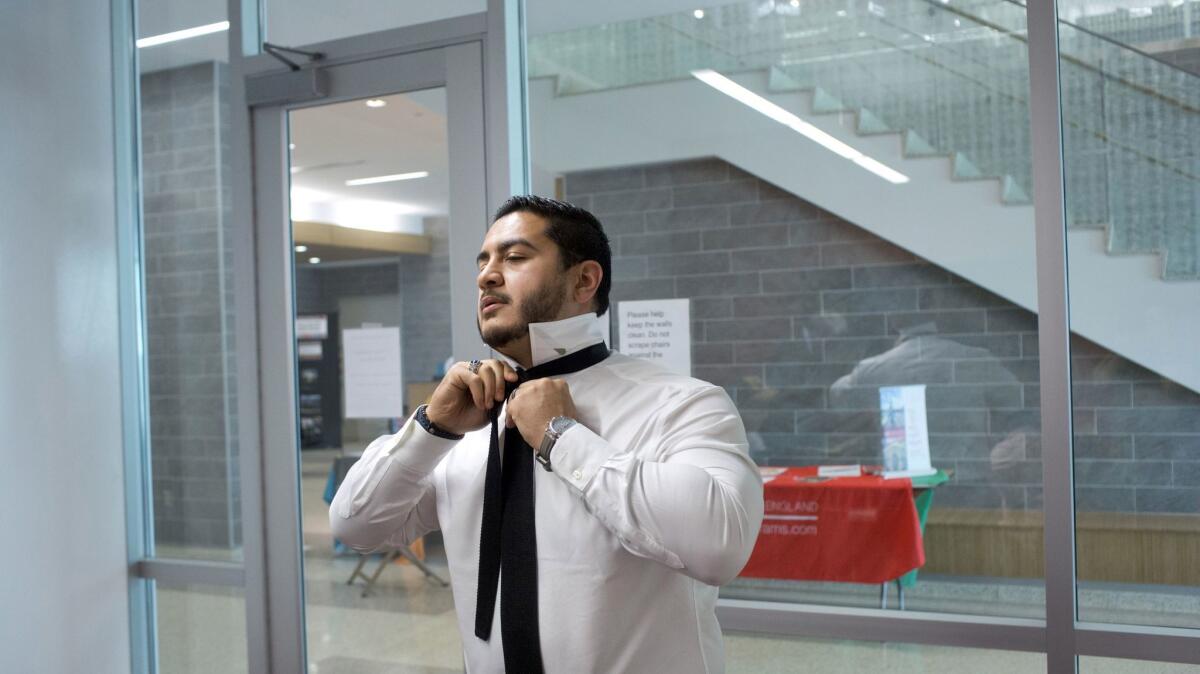
Given the climate, the effort entails no small amount of personal risk.
El-Sayed’s campaign headquarters is kept secret, for safety reasons. The SUV he rides in is purposely nondescript, bearing no hint of its passenger. After numerous death threats — including some aimed at his wife, a psychiatrist pregnant with their first child — he hired a bodyguard.
Still, his candidacy is rooted in a fundamental optimism arising, he suggests, from the experience of his “wholly uncommon if entirely American family.”
He begins most stops by narrating an account of their Thanksgiving dinners. Among those seated are El-Sayed’s father, Mohamed, who leads prayers at his mosque; his father’s second wife, Jackie, whose family has been in Michigan since before the Revolutionary War; his grandma, Judy, a deacon at her Presbyterian church in Flint; and an uncle, Piotr, a Polish immigrant and atheist.
Despite their varied backgrounds and beliefs, El-Sayed says, they are bound by “something they built together, which is a sense of shared future … that allows them to believe in something that is bigger than any of their differences.”
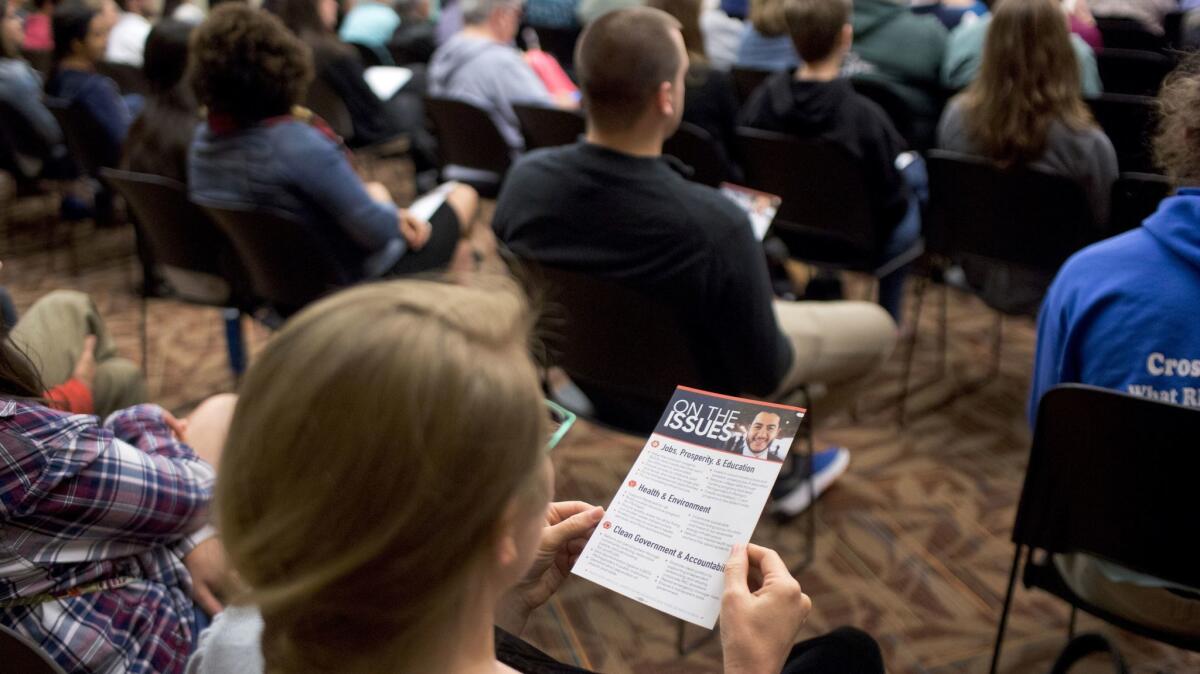
The inference, of course, is that Michigan can do the same, though it’s a far sterner test than finding commonality around a holiday table.
Ron Voelker, 61, works at a big-box store in Holland, a staunchly conservative Dutch-themed community nestled on Lake Michigan’s eastern shore. When the local paper reported El-Sayed’s plans for a town hall meeting, Voelker showed up at Hope College and asked: Is sharia, or Islamic law, compatible with the U.S. Constitution?
The candidate seemed to briefly weigh the question, though it was hardly a new one. He responded in the tone he might have used for one of his college lectures.
The oath he would take as governor to protect and defend the Constitution is the same sworn by “many different leaders of many different backgrounds,” El-Sayed said. To think he would betray that oath because of his Muslim faith was a sign of ignorance and fear, “and I think right now what we need is a little less fear and a little more empathy.”
The crowd of more than 100 responded with loud applause and the longest ovation of El-Sayed’s hour-long appearance.
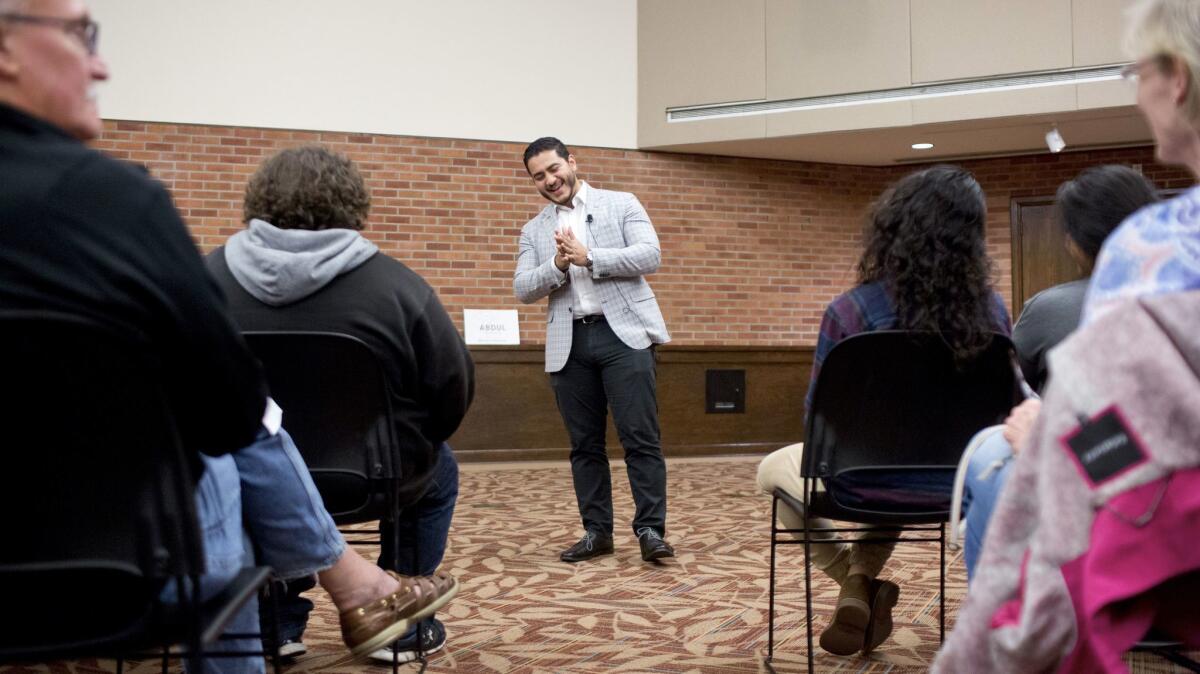
Voelker, though, was unmoved. Afterward, he spoke darkly of a Muslim conspiracy to dominate the world — “people need to wake up” — and identified the Democrat as one of its agents. As he turned to leave, El-Sayed raced over and extended his hand.
For a few seconds the two made awkward small talk. “I appreciate you coming. Thank you so much for being here,” El-Sayed said genially, as Voelker hurriedly slipped out the back door.
ALSO
Prospects of deal for ‘Dreamers’ may hinge on separating Trump from hard-liners on his staff
Sen. Bob Corker is saying what other Republicans will only whisper about President Trump
29 states have legal pot. Jeff Sessions wants to stamp it out, and he’s closer than you think
More to Read
Sign up for Essential California
The most important California stories and recommendations in your inbox every morning.
You may occasionally receive promotional content from the Los Angeles Times.











